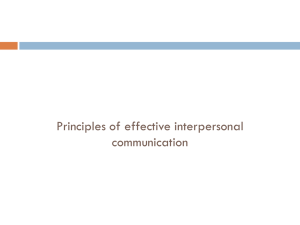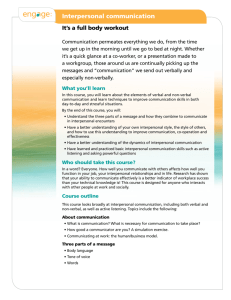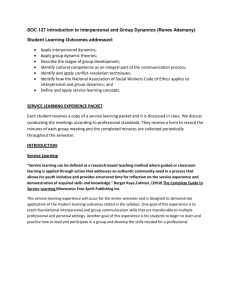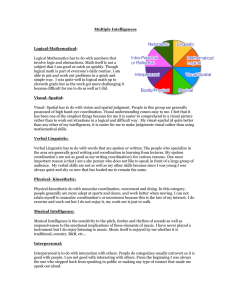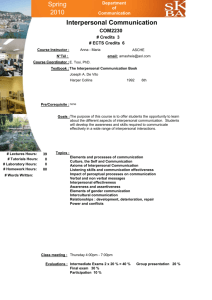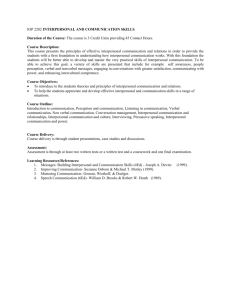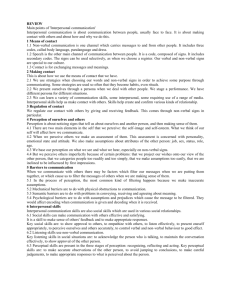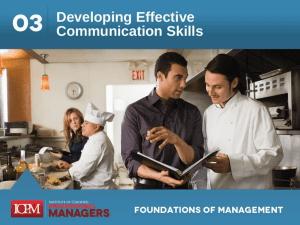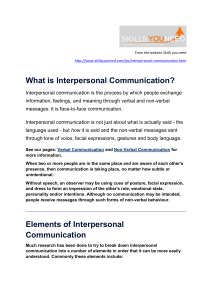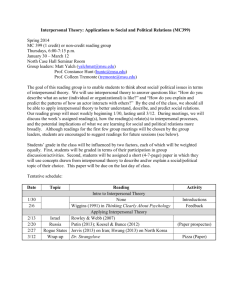UbD Interpersonal Communications & Effects on Health (NPH-H.5-8.5)
advertisement
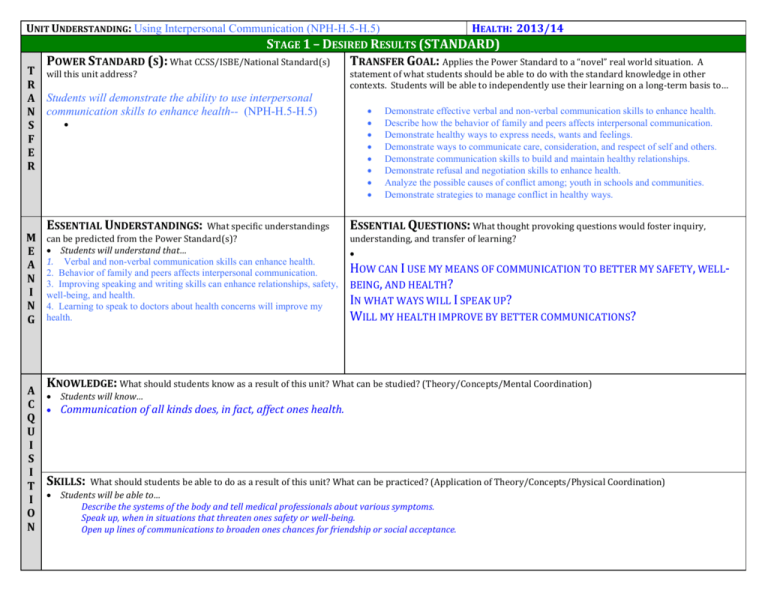
UNIT UNDERSTANDING: Using Interpersonal Communication (NPH-H.5-H.5) HEALTH: 2013/14 STAGE 1 – DESIRED RESULTS (STANDARD) POWER STANDARD (S): What CCSS/ISBE/National Standard(s) TRANSFER GOAL: Applies the Power Standard to a “novel” real world situation. T will this unit address? R A Students will demonstrate the ability to use interpersonal N communication skills to enhance health-- (NPH-H.5-H.5) S F E R M E A N I N G A C Q U I S I T I O N ESSENTIAL UNDERSTANDINGS: What specific understandings can be predicted from the Power Standard(s)? Students will understand that… 1. Verbal and non-verbal communication skills can enhance health. 2. Behavior of family and peers affects interpersonal communication. 3. Improving speaking and writing skills can enhance relationships, safety, well-being, and health. 4. Learning to speak to doctors about health concerns will improve my health. A statement of what students should be able to do with the standard knowledge in other contexts. Students will be able to independently use their learning on a long-term basis to… Demonstrate effective verbal and non-verbal communication skills to enhance health. Describe how the behavior of family and peers affects interpersonal communication. Demonstrate healthy ways to express needs, wants and feelings. Demonstrate ways to communicate care, consideration, and respect of self and others. Demonstrate communication skills to build and maintain healthy relationships. Demonstrate refusal and negotiation skills to enhance health. Analyze the possible causes of conflict among; youth in schools and communities. Demonstrate strategies to manage conflict in healthy ways. ESSENTIAL QUESTIONS: What thought provoking questions would foster inquiry, understanding, and transfer of learning? HOW CAN I USE MY MEANS OF COMMUNICATION TO BETTER MY SAFETY, WELLBEING, AND HEALTH? IN WHAT WAYS WILL I SPEAK UP? WILL MY HEALTH IMPROVE BY BETTER COMMUNICATIONS? KNOWLEDGE: What should students know as a result of this unit? What can be studied? (Theory/Concepts/Mental Coordination) Students will know… Communication of all kinds does, in fact, affect ones health. SKILLS: What should students be able to do as a result of this unit? What can be practiced? (Application of Theory/Concepts/Physical Coordination) Students will be able to… Describe the systems of the body and tell medical professionals about various symptoms. Speak up, when in situations that threaten ones safety or well-being. Open up lines of communications to broaden ones chances for friendship or social acceptance. STAGE 2 –EVIDENCE (ASSESSMENT) SUMMATIVE PERFORMANCE ASSESSMENT (S): USING MULTIPLE OPPORTUNITIES ON VARIOUS DAYS, STUDENTS WILL VERBALLY SHARE THEIR WRITTEN GOOGLE-REFLECTIONS TO PERTINENT QUESTIONS REGARDING; HEALTH ENHANCING BEHAVIOR, INTERPERSONAL COMMUNICATIONS, EMOTIONS, RESPECT, RELATIONSHIPS, NEGOTIATIONS, REFUSAL OF RISKS, AND CONFLICT MANAGEMENT. ASSESSMENT CRITERIA: What criteria will be used in each assessment to evaluate attainment of each desired result? What are the qualities by which learning is judged? Think rubric components!!! (Content, Process, Product, knowledge, skill) Students will clearly articulate their opinions regarding communication situations. Their responses should be realistic and believable. FORMATIVE ASSESSMENT EVIDENCE: Google-journal Role-plays Discussion participation Small-group participation observations STAGE 3 – LEARNING PLAN (ACTIVITY) PRE-ASSESSMENT: Student will journal their answers regarding communication and its relationship to health. here, it will be established, their level of comfort for speaking up about health conditions of their own, or family members. ALIGNED LEARNING ACTIVITIES: Students will role-play various scenarios; emergency, Dr. office visit, Dr. office telephone call, pharmaceutical question phone call, and product manufacturer inquiry phone call/e-mail letter writing. DATE “WE WILL PROCEDURES: PROGRESS MONITORING: …journal answers to preassessment regarding communication during emergencies, Dr. visits for self and family members, pharmacy questions, and product inquiries. …role-play various situations where verbal & written communication is paramount to one’s health. Emphasis will be placed on the ill-effects of possible “miscommunications”. Issue pretest. Journal entry provided as evidence of present understanding. Read journals, write comments in alternate color, for students to read. EXTENSION: When students are finished journaling, they will select a Current Health Magazine and silently read. Students work in pairs First all pairs receive a packet with a given scenario. #1 student receives index cards with predetermined questions. #2 student answers questions. Roles are reversed, and activity is replayed. When finished, students return packet to receive a new one of a different scenario. With each pair working at their own pace, some groups will complete more scenarios than others. Move about the room & listen to various role-plays. Listen for teachable moments and interject with commentary and highlevel questioning. EXTENSION: For students who complete all scenarios, students will go to the health “cool links” for further health information. …journal answers to assessment regarding communication during emergencies, Dr. visits for self and family members, pharmacy questions, and product inquiries. Issue Communications TEST Students will journal answers to SAME questions as pre-test and reflect upon their growth and ability to communicate with regard to their and their family’s health issues. Students also will create a written scenario, with dialogue, of health interest and relationship. Read journals & color-code comment.
